Тема 6. Пассивный залог
Переведите предложение на русский язык. Выберите правильный вариант.
1. Many business-centers… in this city lately.
have been built
2. When …?
was this book written
3. We… to his party.
were invited
4. English… in England.
is spoken
5. This coat… in Spain.
was made
6. The text-book… printed now.
is still being
7. The road… by the earthquake.
was ruined
8. Her husband’s car… last night.
was stolen
9. The article… sent.
has just been
10. America… long ago.
was discovered
11. Many new shops… this year.
have been built
12. The third item… when we heard the bell.
had only been discussed
13. When …?
will this problem be solved
14. We got lost in the forest because we… the way.
hadn’t been shown
15. The little dog… with interest by the people.
was watched
16. I… my son’s homework before he… me to do it.
had checked up, asked
17. This clock… long ago.
was made
18. All the articles… by the end of the week.
will have been written
19. My wife wondered why the key ….
had been hidden
20. This house… a century ago.
was built
21. When …?
was this museum built
22. The article… yet.
has been written
23. Whom… into English by?
was this book translated
24. The article ….
has already been written
25. That problem… when the chief came in.
was being discussed
Тема 7. Условные предложения
Переведите предложение на русский язык. Выберите правильный вариант.
1. If my husband… time, he… with us.
has, will go
2. Ask Fred to ring me up if he ….
comes
3. If I… Mike, I… to him about your problem.
see, will speak
4. If I… a lot of money, I… a country-house last year.
had got, would have bought
5. If we… a car, … the plane.
don’t take, we will miss
6. I… happy if you… to see me.
will be, come
7. If Nick… her, he… her everything.
see, will tell
8. What… if she… him say that?
would his mother think, heard
9. If the tourists …now, they… at the hotel on time.
start off, will come
10. My son… to the party if he… invited.
won’t go, is not
11. If I… a lot of money, I… a house in Spain.
had, would buy
12. They… the party in the country-house if the weather ….
will have, is sunny
13. What… if my friend… tomorrow?
would we do, came
14. If she… hard at her German, she ….
worked, would succeed
15. If we… free yesterday, we… to see her.
had been, would have come
16. If they… the train, they… at home now.
hadn’t missed, would be
17. If this man… so rude, he… so.
were not, wouldn’t have said
18. If the manager… the work yet, the employees… it now.
had done, could discuss
19. If you… French before, you… a good job in Paris last year.
had learned, could have found
20. If it… possible, I… my best.
were, would do
21. If I… you, I… to Spain this summer.
were, would go
22. If I… in your place, I… the best friend.
were, would help
23. If it… tomorrow, we… to the country.
weren’t so cold, would go
24. If I… a lot, I… a house in Spain long ago.
earned, would have bought
25. If we… rich, … all over the world.
became, we’d travel
Приложения
Приложение 1. Схемы построения всех времен английского языка
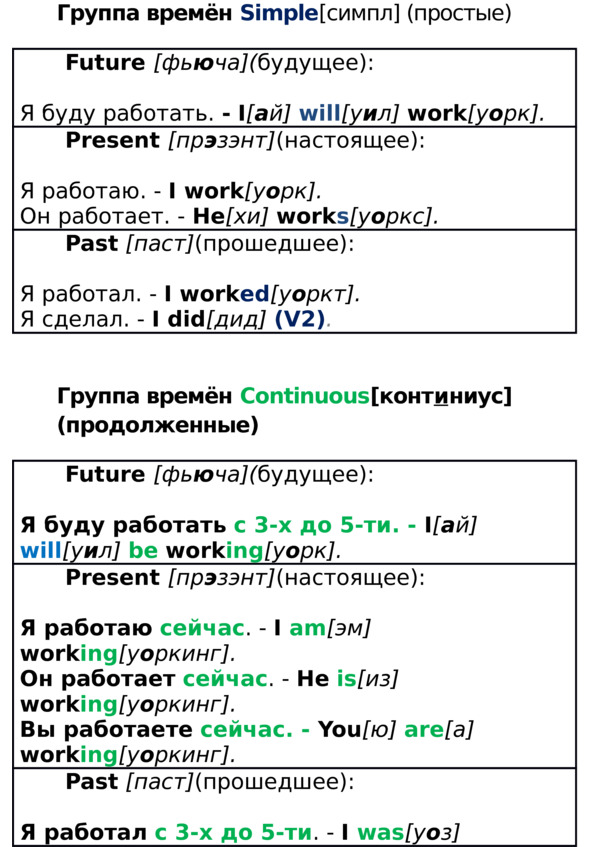
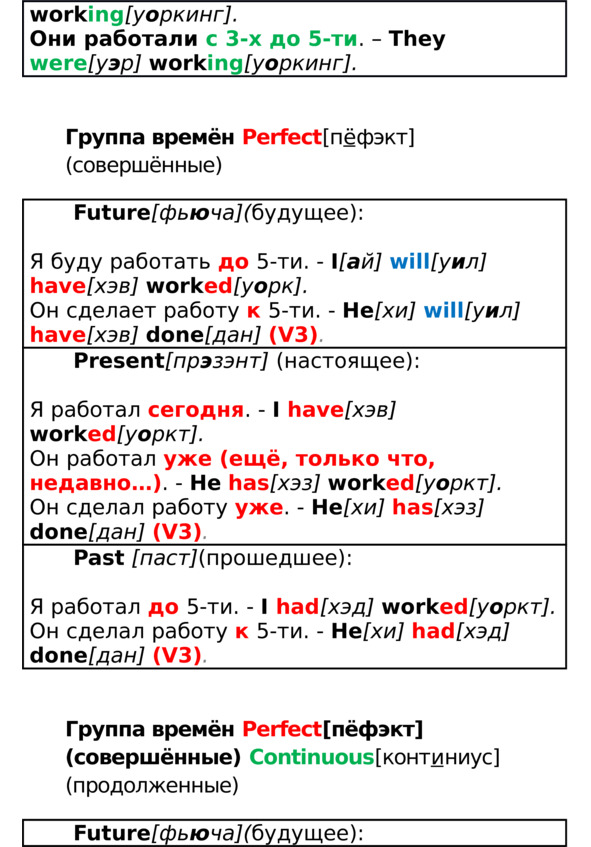
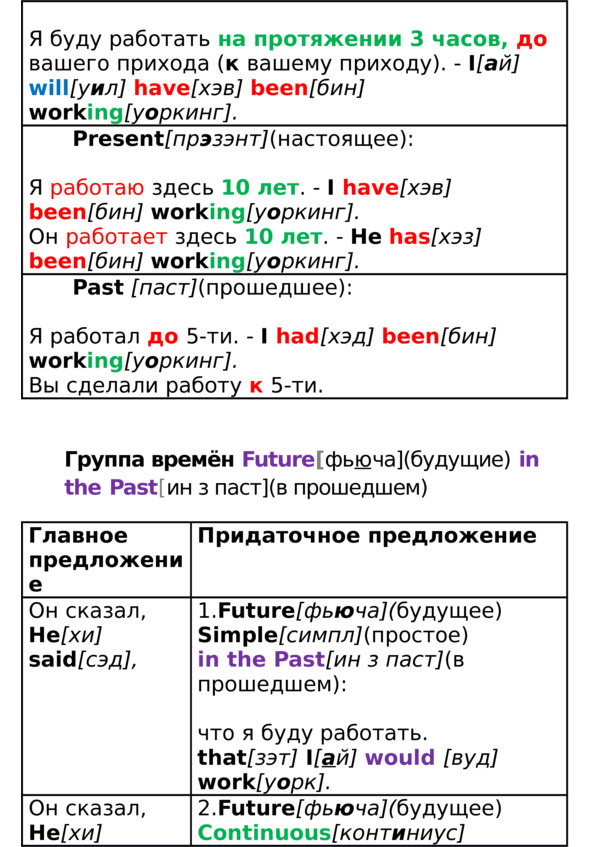
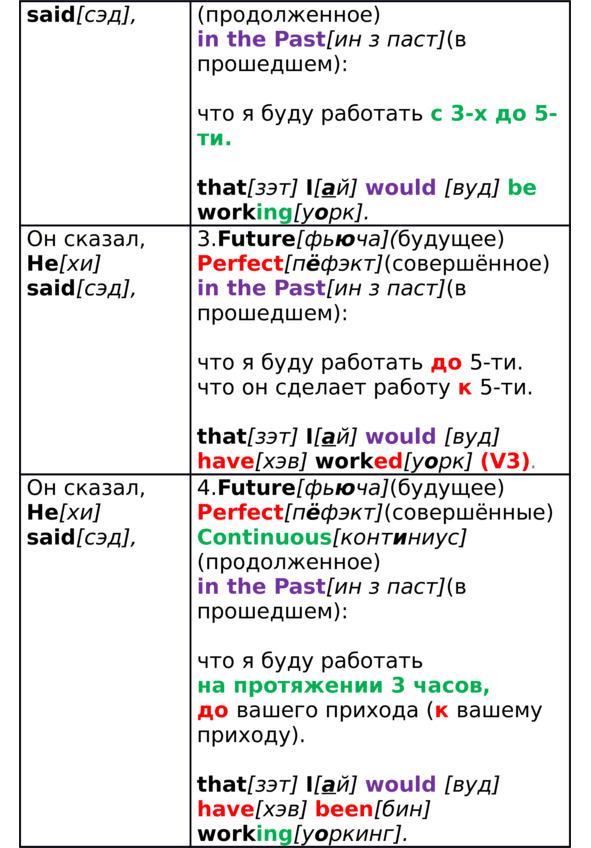

Приложение 2. Основные правила английской грамматики
Согласование времен в английском языке
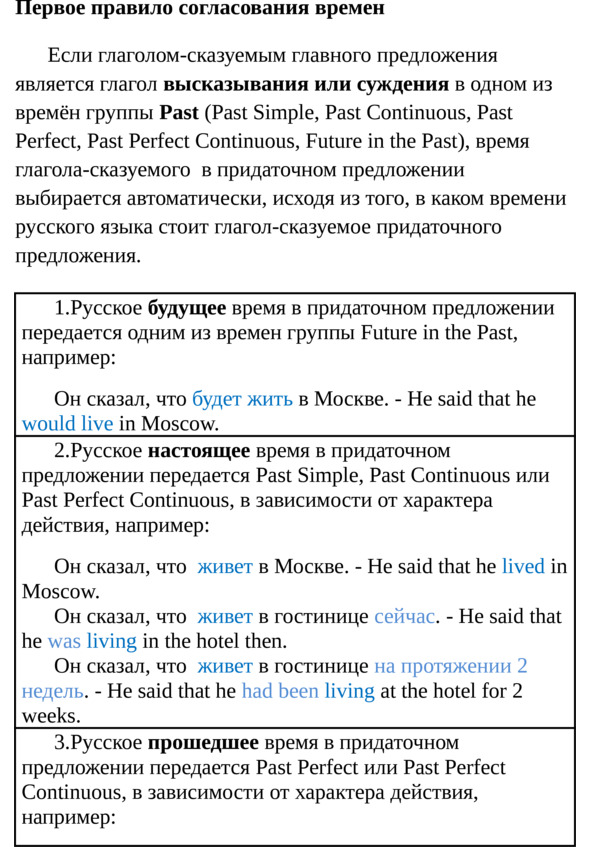
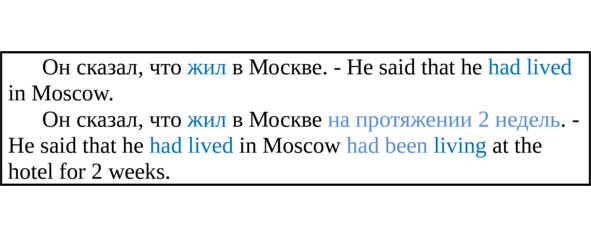
Второе правило согласования времён
Правило согласования времён для глаголов-сказуемых, передающих реальные физические действия в сложносочинённом предложении
Если глаголы-сказуемые в сложносочинённом предложении, передают реальные физические действия, их времена определяются логически, в зависимости от того, как действия в прошлом происходили в отношении друг друга.
Если действия в главном и придаточном происходили в прошлом одновременно, глаголы сказуемые ставятся в Past Simple или в Past Continuous, в зависимости от характера действия, например:
Я вошел в комнату, когда мой друг читал книгу. – I came into the room, when my friend was reading a book.
Я вошел в комнату, а Ник вышел. – I came into the room and Nick went out.
Если есть два действия в прошлом и одно из них происходило раньше, оно выражается в Past Perfect или Past Perfect Continuous, в зависимости от характера действия, а действие, происходившее позже – в Past Simple, например:
Я вошел в комнату, когда Ник уже вышел. – I came into the room when Nick had gone out.
Третье правило согласования времён
Если в сложноподчиненном предложении есть более одного придаточного предложения в прошедшем времени, сначала подбираются времена для глаголов-сказуемых главного предложения и придаточного предложения, к которому оно относится по смыслу, например:
Я объяснил, что я вошел в комнату, когда Ник вышел. – I explained that I had come into the room…
Далее подбирается время для глагола-сказуемого второго придаточного предложения.
Если действие во втором придаточном предложении происходит одновременно с действием в первом придаточном, его глагол-сказуемое следует ставить в простое прошедшее (Past Simple) или в продолженное прошедшее время (Past Continuous Tense), в зависимости от характера действия, например:
Я объяснил, что я вошел в комнату, когда Ник вышел. – I explained that I had come into the room, when Nick went out.
Я объяснил, что я вошел в комнату, когда Ник выходил. – I explained that I had come into the room, when Nick was going out.
Если действие во втором придаточном предложении происходит раньше, чем действие в первом придаточном, его глагол-сказуемое следует ставить в прошедшее совершенное (Past Perfect) или в прошедшее совершенное продолженное время (Past Perfect Continuous Tense), в зависимости от характера действия, например:
Я объяснил, что я вошел в комнату, когда Ник уже вышел. – I explained that I had come into the room, when Nick had gone out.
Я объяснил, что я вошел в комнату, когда Ник уже какое-то время сидел на диване. – I explained that I had come into the room, when Nick had been sitting in the sofa for some time.

